八年级英语上册unit 3教案5
外研版英语八年级上册《Module 5 Lao She Teahouse,Unit 3》教学设计

外研版英语八年级上册《Module 5 Lao She Teahouse,Unit 3》教学设计一. 教材分析外研版英语八年级上册《Module 5 Lao She Teahouse, Unit 3》主要讲述了老舍茶馆的故事。
本节课主要让学生掌握一般过去时的用法,学会描述过去发生的事情。
通过本节课的学习,学生能够运用一般过去时描述自己的经历和感受。
教材内容丰富,插图生动有趣,激发了学生学习的兴趣。
二. 学情分析八年级的学生已经掌握了英语学习的基本语法和词汇,具备一定的听说读写能力。
但部分学生对一般过去时的用法还不够熟练,需要在本节课进一步巩固。
此外,学生对于描述过去发生的事情还有一定的困难,需要通过实例和练习来提高。
三. 教学目标1.知识目标:–掌握一般过去时的构成和用法。
–学会用一般过去时描述过去发生的事情。
2.能力目标:–能够听懂、会说、会读本节课的重点词汇和句子。
–能够运用一般过去时描述自己的经历和感受。
3.情感目标:–培养学生对英语学习的兴趣和热情。
–培养学生团结合作、积极进取的精神风貌。
四. 教学重难点•一般过去时的构成和用法。
•描述过去发生的事情的句子结构。
•一般过去时在具体语境中的运用。
•描述过去发生的事情时的时间状语。
五. 教学方法1.情境教学法:通过设定情境,让学生在实际语境中运用所学知识。
2.任务型教学法:通过完成任务,培养学生运用英语进行交际的能力。
3.小组合作学习:鼓励学生相互讨论、合作,提高学习效果。
六. 教学准备1.教材和教辅资料。
2.多媒体教学设备。
3.图片、卡片等教学辅助工具。
七. 教学过程1.导入(5分钟)利用多媒体展示老舍茶馆的图片,引导学生谈论茶馆的情景。
然后询问学生:“你们有没有去过茶馆?”,让学生用英语表达自己的经历。
2.呈现(10分钟)教师通过展示教材图片,引导学生说出本节课的主要内容。
然后板书一般过去时的构成,并解释其用法。
3.操练(15分钟)学生分组进行角色扮演,模拟去茶馆的场景,运用一般过去时描述自己的经历。
牛津译林版八年级英语上册教案Unit3Reading
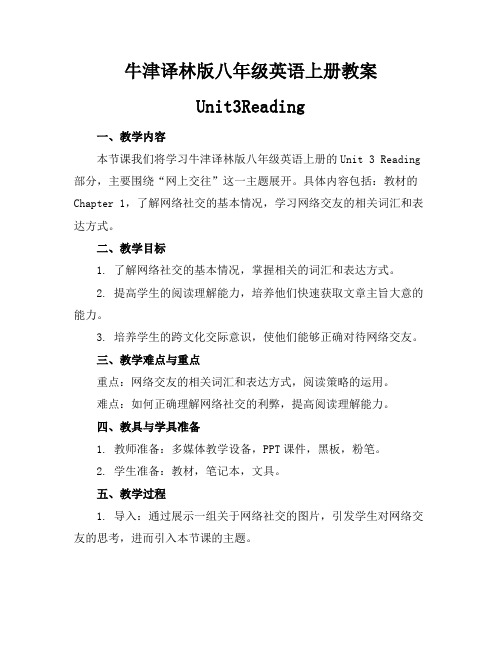
牛津译林版八年级英语上册教案Unit3Reading一、教学内容本节课我们将学习牛津译林版八年级英语上册的Unit 3 Reading 部分,主要围绕“网上交往”这一主题展开。
具体内容包括:教材的Chapter 1,了解网络社交的基本情况,学习网络交友的相关词汇和表达方式。
二、教学目标1. 了解网络社交的基本情况,掌握相关的词汇和表达方式。
2. 提高学生的阅读理解能力,培养他们快速获取文章主旨大意的能力。
3. 培养学生的跨文化交际意识,使他们能够正确对待网络交友。
三、教学难点与重点重点:网络交友的相关词汇和表达方式,阅读策略的运用。
难点:如何正确理解网络社交的利弊,提高阅读理解能力。
四、教具与学具准备1. 教师准备:多媒体教学设备,PPT课件,黑板,粉笔。
2. 学生准备:教材,笔记本,文具。
五、教学过程1. 导入:通过展示一组关于网络社交的图片,引发学生对网络交友的思考,进而引入本节课的主题。
2. 阅读前:教师带领学生回顾网络交友的相关词汇,为新课的学习做好铺垫。
3. 阅读中:学生自主阅读课文,教师提问检查学生对文章的理解,引导学生关注文章的主旨大意。
a. 学生阅读第一段,了解网络社交的普及程度。
b. 学生阅读第二段,了解网络交友的优缺点。
c. 学生阅读第三段,学习如何正确对待网络交友。
4. 阅读后:教师组织学生进行小组讨论,讨论网络交友的利弊以及如何保护自己,然后进行课堂分享。
5. 例题讲解:针对本节课的重点,教师为学生讲解阅读理解题型的解题策略,并进行实际操作演示。
6. 随堂练习:学生完成课后练习题,巩固所学知识。
六、板书设计1. Unit 3 Reading: Online friendship2. 词汇:普及(popular),优点(advantage),缺点(disadvantage),谨慎(cautious)3. 阅读策略:快速浏览,关注文章主旨,关注细节七、作业设计a. What are the advantages of online friendship?b. What are the disadvantages of online friendship?c. How can we protect ourselves when making friends online?2. 答案:见教材课后练习答案。
牛津译林版八年级英语上册Unit3精品教案

牛津译林版八年级英语上册Unit3精品教案一、教学内容本节课选自牛津译林版八年级英语上册Unit 3,主要内容包括:Reading部分的“Alex and his classmates are on their way to the Penang Hill.”以及“Alex and his classmates visit the snake farm.”两个章节。
通过本节课的学习,学生将掌握现在进行时态的用法,了解并学会描述旅行中的所见所闻。
二、教学目标1. 能够理解并运用现在进行时态描述正在进行的动作。
2. 能够运用本节课所学的词汇和句型描述旅行中的经历。
3. 培养学生的阅读理解能力,提高他们的英语听说技能。
三、教学难点与重点1. 教学难点:现在进行时态的用法以及旅行相关词汇的运用。
2. 教学重点:阅读理解能力的培养和英语听说技能的提高。
四、教具与学具准备1. 教具:PPT、录音机、磁带、黑板、粉笔。
2. 学具:教材、练习本、彩色笔。
五、教学过程1. 导入:通过展示一组旅行图片,引导学生谈论他们在旅行中的有趣经历,激发学生的学习兴趣。
2. 阅读前:播放Reading部分的录音,让学生听并回答问题,了解文章大意。
3. 阅读中:引导学生细读文章,学习现在进行时态的用法,并完成相应的练习。
4. 阅读后:组织学生进行小组讨论,运用本节课所学的词汇和句型描述旅行中的所见所闻。
5. 例题讲解:针对本节课的重点语法和词汇,设计例题并进行讲解。
6. 随堂练习:让学生完成教材上的练习题,巩固所学知识。
六、板书设计1. Unit 3 Reading: Alex and his classmates visit the Penang Hill.2. 重点词汇:hill, snake, farm, visit, exciting, interesting, dangerous, feed, watch, climb等。
【人教版】八年级英语上册 Unit 3 全单元英文教案
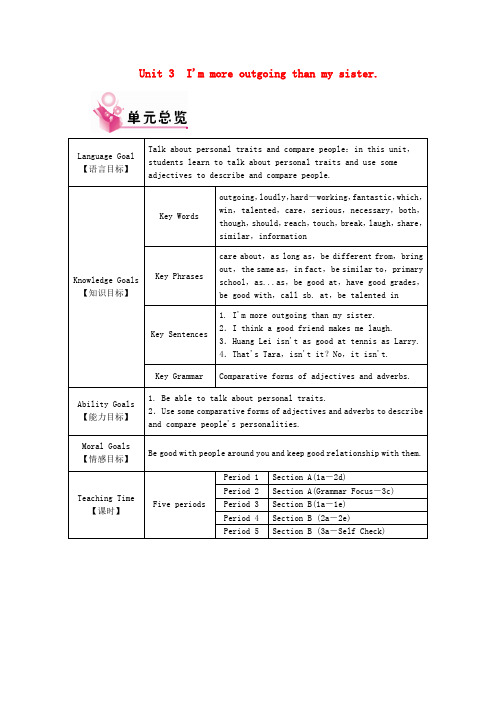
Unit 3I'm more outgoing than my sister.Section A是基本的语言部分,打好本单元目标语言的基础。
运用听力(1b,2a,2b)、pair-work(1c,2c)、role-play (2d)等口语练习活动,层层递进,步步深入,充分培养学生学习目标英语的语感。
目标语言(语法和词汇)是在每个单元的开始通过图片和对话框呈现的。
图片将帮助学生建立一个自然的语境,让学生清晰地理解新的语言目标,熟悉这些语言在日常生活中是怎样使用的。
Section B是比较级的拓展和综合的语言运用。
1a,1b通过讨论在朋友身上什么是最重要的,为后面提供基本句子如makes me laugh等。
1c,1d通过听力继续以朋友为话题以比较级为语法谈论朋友。
2b,3c是通过阅读和写作最后达到综合运用语言的目的,2b培养真实生活中的语言阅读技能。
4通过谈论谁是合适的student helper来继续巩固运用目标语言。
Self Check 2考查五个形容词的用法及区别形容词比较级与原级的使用。
Self Check 3运用比较级对比自己和好友。
第一课时Section A(1a-2d)Teaching Goals【教学目标】Key words:outgoing,better,loudly,quietly,hard-working,compet ition,fantastic,which,clearly,winKey phrases:play the drums,more...than,as...as,singing competition,have funKey sentences:1. I'm more outgoing than my sister.2. That's Tara,isn't it?No,it isn't.3. I think she sang more clearly than Nelly.Teaching Key Points【教学重点】The vocabulary:outgoing,better,loudly,quietly,hard-working,competition,fantastic,which,clea rly,win,more...than,as...asTarget language:—Is that Sam?—No,that's Tom. Sam has longer hair than Tom.—That's Tara,isn't it?—No,it isn't. It's Tina. Tina is taller than Tara. And she also sings more loudly than Tara.—Did you like the singing competition yesterday,Anna?—Oh,it was fantastic!Nelly sang so well!Is Tom smarter than Sam?Teaching Difficult Points【教学难点】Oral practice using the target language above.Teaching Aids【教学工具】An English textbook,a tape recorder,CAI or courseware.Teaching Steps【教学过程】★Step 1Leading inAsk a student to introduce herself/himself.★Step 2Pre-taskPage 17,1a.1.Show some pictures to Ss.Say,They are stars. Ask Ss to tell what they see.Ask Ss to use the words:tall,loudly,thin,long hair,short hair,heavy,quietly,short and so on.2.Then ask Ss to repeat these sentences:Yao Ming is taller than Ronaldo.★Step 3W hile-taskPage 17,1c & 1b.1.Call attention to the picture.2.Point out the sample conversation in Activity 1c.Say,Now work with a partner. Make yo ur own conversation about the twins.3.Ask several pairs to say one or more of their conversations.4.Then listen to the recording. Ask Ss to number the twins.5.Check the answers.Page 18,2a.1.Point out the two columns and read the headings:-er,-ier and more. Then point out the words in the box. Read.Say,Now listen and write the“-er”and“-ier”wo rds in the first column and the words that use “more” in the second column.2.Play the recor ding and check the answers.Page 18,2b.1.Point out the picture and the two boxes with the headings Tina and Tara.Say,Listen to the recording. Write sentences in the boxes.2.Play the recording and check the answers.★Step 4Post-taskPage 18,2c & 2d.1.Point out the chart in Activity 2c and on Page 81.Say,Make your own conversati ons according to the information. Ask pairs to continue on their own.2.Correct the answers.3.Make students scan the conversation in 2d.4.Teach and then make Ss role-play the conversation in pairs. In this part,student A will be Julie. Student B will be Anna. As they talk,move around to monitor their work. Offer language or pronunciation support as needed.5.Have a group of students present their conversation to the class.★Step 5Homework1.How are you and your si ster/brother different?Write down.2.Do the exercises on Page 15 in students' book.Board Design板书设计Unit 3I'm more outgoing than my sister.The first period Section A(1a-2d)1.Words:outgoing,better,loudly,quietly,hard-working,competition,fantastic,which,win,clearly2.Target language:①A:That's Tara,isn't it?B:No,it isn't.②A:Is Tom smarter than Sam?B:No,he isn't. Sam is smarter than Tom.第二课时Section A(GF-3c)Teaching Goals【教学目标】Key sentences:1.Is Tara more outgoing than Tina?No,she isn't. Tina is more outgoing than Tara.2.Does Tara work as hard as Tina?Yes,she does.3.Who is smarter,your mother or your father?I think my mother is smarter than my father.Teaching Key Points【教学重点】1.Grammar Focus. The sentences in the box.2.The comparative forms of adjectives and adverbs.Teaching Difficult Points【教学难点】1.The comparative forms of adjectives and adverbs.2.Use some adjectives to describe people and use their comparative forms to compare people.Teaching Aids【教学工具】An English textbook,CAI or courseware.Teaching Steps【教学过程】★Step 1Leading inAsk,How are you and your mother/father different?Ask some Ss to answer.★Step 2Pre-taskPage 19,Grammar Focus.1.Review the grammar box. Ask Ss to read the sentences to the class.2.Write the phrases “more outgoing than”.Say,When you compare things using words with three or more syllables,you use the word “more”.3.Call attention to the word “friendly”,circle “y” and say,When a word ends in “y”,change “y” to an “i”and add“-er”.4.Practice reading the sentences in the chart.★Step 3While-taskPage 19,3a & 3b.1.Call students' attention to 3a.2.Make students complete the tasks individually.3.Choose Ss to give their answers.4.Correct the answers.5.Practice reading.6.Turn to 3b.And choose a student to answer the five questions according to the example.★Step 4Post-taskPage 19,3c.1.Ask students to read the sample conversation in the box.2.Have students work in pairs to complete the chart.3.Ask some pairs to present their dialogues.★Step 5Homework1.Compare one of your best friends with you. Write down the same and different things between you two.2.Do the exercises on Page 16 in students' book.Board Design板书设计Unit 3I'm more outgoing than my sister.The second period Section A(GF-3c)1.Target language:①A:Is Tara more outgoing than Tina?B:No,she isn't. Tina is more outgoing than Tara.②A:Are you as friendly as your sister?B:No,I'm not. I'm friendlier.③A:Does Tara work as hard as Tina?B:Yes,she does.④A:Who is smarter,your mother o r your father?B:I think my mother is smarter than my father.2.Answers to 3a.第三课时Section B(1a-1e)Teaching Goals【教学目标】Key words & phrases:talented,truly,care,be talented in,the same as,be good at,care about,make sb. laughKey sentences:1.I think a good friend makes me laugh.2.Molly studies harder than her best friend.Teaching Key Points【教学重点】The vocabulary:talented,care,care about,be talented inTarget language:I think a good friend makes me laugh.For me,a good friend likes to do the same things as me.Yes,and a good friend is talented in music,too.That's not very important for me...Molly studies harder than her best friend.Well,Mary and her best friend are both tall.Teaching Difficult Points【教学难点】Use the target language to talk with your classmates about your opinions on what makes a good friend.Teaching Aids【教学工具】An English textbook,a tape recorder,CAI or courseware.Teaching Steps【教学过程】★Step 1Leading in1.Show a maxim to Ss:A friend in need is a friend indeed.2.Ask,What kinds of things are important in a friend?★Step 2Pre-taskPage 20,1a.1.Read each description to the class and ask the Ss to repeat.2.What kinds of things are important in a friend?Rank the things below 1—7(1 is the most important).3.Ask different Ss to copy the seven phrases on the board. Then read the phrases together.★Step 3While-taskPage 20,1b.1.Say,Now make your own statements about friends using the phrases in Activity 1a.2.Ask some Ss to tell the class what they look for in a friend. And say,Who is your best friend?Page 20,1c.Play the recording and check the answers.Page 20,1d.Play the recording and check the answers.★Step 4Post-taskPage 20,1e.1.Say,Now work with your partner. Make a conversation using information in the chart.2.Ask several pairs to say their conversations to the class.★Step 5HomeworkDo the exercises on Page 17 in students' book.Board Design板书设计Unit 3I'm more outgoing than my sister.The third period Section B(1a-1e)1.Key vocabulary:truly,be talented in,the same as,be good at,care about,make sb. laugh2.Target language:A:Molly studies harder than her best friend.B:Well,Mary and her best friend are both tall.第四课时Section B(2a-2e)Teaching Goals【教学目标】Key words:serious,mirror,kid,necessary,both,though,grade,should,saying,reach,hand,touch,heart,fact,break,arm,laugh,share,loud,similarKey phrases:as long as,be different from,bring out,the same as,care about,in fact,be similar toKey sentences:1. I'm quieter and more serious than most kids.2.I don't really care if my friends are the same as me or different.3.Huang Lei isn't as good at tennis as Larry.4.A true friend reaches for your hand and touches your heart.Teaching Key P oints【教学重点】The vocabulary:serious,necessary,both,though,should,reach,touch,break,laugh,share,loud,similar,as long as,be different from,the same as,in fact,be similar to Target language:I'm quieter and more serious than most kids. That's why I like reading books and study harder in class.In fact,she's funnier than anyone I know.I know she cares about me because she's always there to listen.Teaching Difficult Points【教学难点】Talk about the famous sayings about friends.Teaching Aids【教学工具】An English textbook,CAI or courseware.Teaching Steps【教学过程】★Step 1Leading in1.Greetings.2.Ask,Should friends be the same or different?Choose 2 or 3 students to talk about their opinions. Say,Today we'll read about what these people think.★Step 2Pre-taskPage 21,2a & 2b.1.Project some famous sayings about friendship on the screen. Ask Ss to guess their meanings and think of more.2.Project these new words on the screen or write them on the board and teach the new words. Ask students to repeat them. And make sure everyone knows the meanings.serious adj.严肃的;mirror n.镜子;necessary adj.必需的;both adj. & pron.两个;though adv.不过,可是 conj.虽然;should modal v.应该;reach v.到达;touch v.感动,触摸;fact n.事实;break v.(使)破;laugh v.笑;share v.分享;similar adj.类似的;as long as只要;be different from 与……不同;bring out 使显现;the same as和……相同;in fact事实上;be similar to与……相像的3.Make students scan the three articles first. Ask students to put a mark in contents that are unfamiliar to them. Then the teacher lead Ss to learn them. Pay attention to the new words and phrases on the screen.4.Practice reading.★Step 3While-taskPage 22,2c & 2d.1.Make students read 2b again. Then judge if the eight statements in 2c are true(T)or false(F).2.Choose students to give their answers.3.Check the answers.4.Ask,How do you and your friends compare with the people in the article?Choose a student to talk about it with five sentences.★Step 4Post-taskPage 22,2e.1.Read the four sayings about friends.2.Talk about these questions with your partner:Which saying about friends is your favorite?Which friend do you think about when you read this saying?Why?Begin your statements according to the example:My favorite saying is...It makes me think about my best friend. She/He is...★Step 5Homework1.Search for five famous sayings about friends. Write them in your exercise books.2.Do the exercises on Page 18 in students' book.Board Design板书设计Unit 3I'm more outgoing than my sister.The fourth period Section B(2a-2e)1.Words:serious,mirror,necessary,both,grade,should,saying,reach,hand,touch,fact,break,laugh,share,loud,similar2.Phrases:as long as,be different from,bring out,the same as,care about,in fact,be similar to3.Sentences:①I'm quieter and more s erious than most kids.②Huang Lei isn't as good at tennis as Larry.③Friends are like books-you don't need a lot of them as long as they're good.④A true friend reaches for your hand and touches your heart.第五课时Section B(3a-Self Check)Teaching Goals【教学目标】Key words & phrases:primary,information,primary school,be good with,call sb. at,have good gradesKey sentences:1.The English Study Center needs a weekend student helper for primary school stude nts.2.Call the English Study Center at 443-5667 for more information.3.So who do you think should get the job,Jenny or Jill?Teaching Key Points【教学重点】The vocabulary:information,primary school,have good grades,be good with,call sb. at...Teaching Difficult Points【教学难点】Writing practice.Teaching Aids【教学工具】An English textbook,CAI or courseware.Teaching Steps【教学过程】★Step 1Leading in1.Greetings.2.Check the homework.★Step 2Pre-taskPage 23,3a.1.Look at the pictures and the information in the chart.2.Compare Wang Lingling with Liu Lili. Write down the results.3.Choose a student to present his or her answers.★Step 3While-taskPage 23,3b & 3c.1.Complete the task in 3b.2.Write two paragraphs describing your friends using the notes you make in 3b.3.Choose 2 or 3 students to read their competitions loudly.4.Correct the mistakes.★Step 4Post-taskPage 24,Part 4.1.Write the names of two outgoing students on the board. Say,Who do you think should get the job,A or B?2.Ask Ss to work in pairs.3.Ask some pairs who they think should get the job and why.★Step 5ExercisePage 24,Self Check.1.Ask students to work on their own.2.Check the answers.★Step 6Homework1.Compare two of your best friends. Write five sentences using comparatives.2.Do the exercises on Page 19 in students' book.Board Design板书设计Unit 3I'm more outgoing than my sister.The fifth period Section B(3a-Self Check)1.Key vocabulary:informat ion,primary school,be good with,call sb. at+电话号码,have good grades2.Sentences:①Call the English Study Center at 443-5667 for more information.②Jenny is smarter,but I think Jill is more outgoing.。
英语牛津译林八上Unit3教案全单元

b.布置一篇关于户外活动的作文,要求学生运用所学知识,提高写作能力。
c.推荐与户外活动相关的英语阅读材料,拓展学生的知识面,提高阅读理解能力。
本节课程教学技巧和窍门
一、语言语调
1.在讲解现在进行时态时,教师应注意语调的变化,以引起学生的注意。
2.在提问和回答环节,使用升调和降调,增加语言的感染力。
二、时间分配
c. Integrated skills部分:学生通过听力和口语练习,运用现在进行时态进行交流。
3.例题讲解:针对本节课的重点和难点,讲解典型例题,帮助学生巩固所学知识。
4.随堂练习:设计相关练习题,让学生在课堂上及时巩固所学知识。
5.小结:对本节课的内容进行总结,强调现在进行时态的用法。
六、板书设计
2.拓展活动:鼓励学生运用现在进行时态进行日常交流,提高口语表达能力;布置作文和推荐阅读材料。
详细说明:
1.针对性辅导:教师根据学生在课堂上的表现和作业情况,了解学生对现在进行时态的掌握情况,针对问题进行一对一或小组辅导,帮助学生克服难点。
2.拓展活动:
a.鼓励学生在日常生活中,用现在进行时态进行口语交流,提高口语表达能力。
七、作业设计
1.作业题目:
a.根据所给图片,用现在进行时态描述图片中的动作。
b.根据课文内容,完成一篇关于一次户外活动的文章。
2.答案:
八、课后反思及拓展延伸
1.反思:通过课后反思,教师了解学生对现在进行时态的掌握情况,针对学生的问题进行针对性的辅导。
2.拓展延伸:
a.鼓励学生运用现在进行时态进行日常交流,提高口语表达能力。
b.布置一篇关于户外活动的作文,让学生巩固所学知识,并提高写作能力。
新人教版八年级英语上册Unit3 教案

新人教版八年级英语上册Unit3 教案本教案针对新人教版八年级英语上册Unit3的教学内容。
该单元主要包含以下两大话题:1)时间和频率表达方式;2)日常活动及其规划。
通过教学,学生将能够熟练运用常用的时间和频率表达方式,并能够描述日常活动并做出相应的规划安排。
1.能够运用常见的时间和频率表达方式,如days of the week。
months of the year。
at。
on。
in。
every等;2.能够描述日常活动,并能够就日常活动做出规划安排;3.能够流利地使用所学词汇和句型进行交流。
1.时间和频率表达方式的准确运用;2.描述日常活动的基本句型的运用。
第一课时1.教授并练days of the week;2.学生进行日常活动的描述和规划。
1.复并巩固days of the week;2.教授并练months of the year;3.学生进行月份与日常活动的搭配练。
1.复并巩固days of the week和months of the year;2.教授并练at。
on。
in等时间表达方式;3.学生进行日常活动时间的描述练。
1.复并巩固时间表达方式;2.教授并练every的用法;3.学生进行日常活动规划的练。
1.情境教学法:通过创设真实的情境,让学生在实际生活中应用所学知识;2.合作研究法:通过小组合作研究,鼓励学生相互交流和合作,提高研究效果;3.游戏教学法:通过游戏形式激发学生的兴趣,提高研究积极性。
1.针对每一课时的研究内容,设计相应的练题进行评估;2.利用小组活动和教师提问的方式进行课堂实时评估;3.通过学生的作业和考试成绩,对研究效果进行总体评估。
1.教材:新人教版八年级英语上册Unit3;2.多媒体设备:投影仪、音响等;3.黑板和白板笔。
通过教材分析,我将采用情境教学法、合作研究法和游戏教学法等多种教学方法,来激发学生研究的兴趣,提高研究效果。
同时,将充分利用教学资源,使课堂内容更加生动有趣。
人教版八年级英语上册教案unit3 Unit 3教案

Unit 3 I’m more outgoing than my sister Teaching PlanI 教学内容、目标与要求II 教学内容分析本单元以描述某人的个性特征为中心而展开, 从外表和性格两方面比较人物之间的相同与不同点, 由此引出taller, shorter, thinner, longer, heavier, calmer, wilder, quieter, funnier, more athletic, more popular, more serious, more outgoing 等词汇, 以及“S + be + adj.比较级+than+被比较对象”这个重要的句子结构。
Section A部分重在要求听说读三个方面比较不同双胞胎之间外表和性格的区别, 附带着在3a也提出了as….as 结构the same as结构表达两人的相同之处。
与Section A部分比较, Section B 部分则深入到比较自己和朋友的相同与不同之处, 并提出了“选择朋友”这个话题, 引导学生正确评价朋友, 引导学生结识真正的好朋友。
III 教学过程建议围绕本单元“描述个性特征”这一话题,教师可以在课堂上展开系列的两人一组活动引出本单元的主要单词和句子结构“S + be + adj.比较级+than+被比较对象”。
如任务一:你眼里的我?学生两人一组展开活动,分别在各自的卡片上写下一些形容词,描述对方的身体和性格特点。
任务二:咱们相同吗?学生两人一组展开活动,通过比较各自的卡片,找出自己和对方相同的地方,简单地表述这些相同之处,然后进一步比较这些相同之处,说说它们在程度上的区别。
也可以准备一些教师自己或学生不同时期的照片,先用所学过的形容词描述照片,然后把两类照片进行比较,从而引出本单元所要讲的形容词的比较级。
本单元的听力练习教师可以根据学生的实际情况适当的扩展增加或降低难度。
在“说”方面,教师应尽量选择学生感兴趣的话题,激发学生开口交流。
新人教版初中英语八年级上册Unit 3 教案

Unit 3I'm more outgoing than my sister.Section A是基本的语言部分,打好本单元目标语言的基础。
运用听力(1b,2a,2b)、pair-work(1c,2c)、role-play (2d)等口语练习活动,层层递进,步步深入,充分培养学生学习目标英语的语感。
目标语言(语法和词汇)是在每个单元的开始通过图片和对话框呈现的。
图片将帮助学生建立一个自然的语境,让学生清晰地理解新的语言目标,熟悉这些语言在日常生活中是怎样使用的。
Section B是比较级的拓展和综合的语言运用。
1a,1b通过讨论在朋友身上什么是最重要的,为后面提供基本句子如makes me laugh等。
1c,1d通过听力继续以朋友为话题以比较级为语法谈论朋友。
2b,3c是通过阅读和写作最后达到综合运用语言的目的,2b培养真实生活中的语言阅读技能。
4通过谈论谁是合适的student helper来继续巩固运用目标语言。
Self Check 2考查五个形容词的用法及区别形容词比较级与原级的使用。
Self Check 3运用比较级对比自己和好友。
第一课时Section A(1a-2d)Teaching Goals【教学目标】Key words:outgoing,better,loudly,quietly,hard-working,competition,fantastic,which,clearly,winKey phrases:play the drums,more...than,as...as,singing competition,have funKey sentences:1. I'm more outgoing than my sister.2. That's Tara,isn't it?No,it isn't.3. I think she sang more clearly than Nelly.Teaching Key Points【教学重点】The vocabulary:loudly,quietly,hard-working,competition,fantastic,which,clearly,win,more...than,as...asTarget language:—Is that Sam?—No,that's Tom. Sam has longer hair than Tom.—That's Tara,isn't it?—No,it isn't. It's Tina. Tina is taller than Tara. And she also sings more loudly than Tara.—Did you like the singing competition yesterday,Anna?—Oh,it was fantastic!Nelly sang so well!Is Tom smarter than Sam?Teaching Difficult Points【教学难点】Oral practice using the target language above.Teaching Aids【教学工具】An English textbook,a tape recorder,CAI or courseware.Teaching Steps【教学过程】★Step 1Leading inAsk a student to introduce herself/himself.★Step 2Pre-taskPage 17,1a.1.Show some pictures to Ss.Say,They are stars. Ask Ss to tell what they see.Ask Ss to use the words:tall,loudly,thin,long hair,short hair,heavy,quietly,short and so on.2.Then ask Ss to repeat these sentences:Yao Ming is taller than Ronaldo.★Step 3While-taskPage 17,1c & 1b.1.Call attention to the picture.2.Point out the sample conversation in Activity 1c.Say,Now work with a partner. Make your own conversation about the twins.3.Ask several pairs to say one or more of their conversations.4.Then listen to the recording. Ask Ss to number the twins.5.Check the answers.Page 18,2a.1.Point out the two columns and read the headings:-er,-ier and more. Then point out the words in the box. Read.Say,Now listen and write the“-er”and“-ier”words in the first column and the words that use “more” in the second column.2.Play the recording and check the answers.Page 18,2b.1.Point out the picture and the two boxes with the headings Tina and Tara.Say,Listen to the recording. Write sentences in the boxes.2.Play the recording and check the answers.★Step 4Post-taskPage 18,2c & 2d.1.Point out the chart in Activity 2c and on Page 81.Say,Make your own conversations according to the information. Ask pairs to continue on their own.2.Correct the answers.3.Make students scan the conversation in 2d.4.Teach and then make Ss role-play the conversation in pairs. In this part,student A will be Julie. Student B will be Anna. As they talk,move around to monitor their work. Offer language or pronunciation support as needed.5.Have a group of students present their conversation to the class.★Step 5Homework1.How are you and your sister/brother different?Write down.2.Do the exercises on Page 15 in students' book.Board Design板书设计Unit 3I'm more outgoing than my sister.The first period Section A(1a-2d)1.Words:outgoing,better,loudly,quietly,hard-working,competition,fantastic,which,win,clearly2.Target language:①A:That's Tara,isn't it?B:No,it isn't.②A:Is Tom smarter than Sam?B:No,he isn't. Sam is smarter than Tom.第二课时Section A(GF-3c)Teaching Goals【教学目标】Key sentences:1.Is Tara more outgoing than Tina?No,she isn't. Tina is more outgoing than Tara.2.Does Tara work as hard as Tina?Yes,she does.3.Who is smarter,your mother or your father?I think my mother is smarter than my father.Teaching Key Points【教学重点】1.Grammar Focus. The sentences in the box.2.The comparative forms of adjectives and adverbs.Teaching Difficult Points【教学难点】1.The comparative forms of adjectives and adverbs.2.Use some adjectives to describe people and use their comparative forms to compare people.Teaching Aids【教学工具】An English textbook,CAI or courseware.Teaching Steps【教学过程】★Step 1Leading inAsk,How are you and your mother/father different?Ask some Ss to answer.★Step 2Pre-taskPage 19,Grammar Focus.1.Review the grammar box. Ask Ss to read the sentences to the class.2.Write the phrases “more outgoing than”.Say,When you compare things using words with three or more syllables,you use the word “more”.3.Call attention to the word “friendly”,circle “y” and say,When a word ends in “y”,change “y” to an “i” and add“-er”.4.Practice reading the sentences in the chart.★Step 3While-taskPage 19,3a & 3b.1.Call students' attention to 3a.2.Make students complete the tasks individually.3.Choose Ss to give their answers.4.Correct the answers.5.Practice reading.6.Turn to 3b.And choose a student to answer the five questions according to the example.★Step 4Post-taskPage 19,3c.1.Ask students to read the sample conversation in the box.2.Have students work in pairs to complete the chart.3.Ask some pairs to present their dialogues.★Step 5Homework1.Compare one of your best friends with you. Write down the same and different things between you two.2.Do the exercises on Page 16 in students' book.Board Design板书设计Unit 3I'm more outgoing than my sister.The second period Section A(GF-3c)1.Target language:①A:Is Tara more outgoing than Tina?B:No,she isn't. Tina is more outgoing than Tara.②A:Are you as friendly as your sister?B:No,I'm not. I'm friendlier.③A:Does Tara work as hard as Tina?B:Yes,she does.④A:Who is smarter,your mother or your father?B:I think my mother is smarter than my father.2.Answers to 3a.第三课时Section B(1a-1e)Teaching Goals【教学目标】Key words & phrases:talented,truly,care,be talented in,the same as,be good at,care about,make sb. laughKey sentences:1.I think a good friend makes me laugh.2.Molly studies harder than her best friend.Teaching Key Points【教学重点】The vocabulary:talented,care,care about,be talented inTarget language:I think a good friend makes me laugh.For me,a good friend likes to do the same things as me.Yes,and a good friend is talented in music,too.That's not very important for me...Molly studies harder than her best friend.Well,Mary and her best friend are both tall.Teaching Difficult Points【教学难点】Use the target language to talk with your classmates about your opinions on what makes a good friend.Teaching Aids【教学工具】An English textbook,a tape recorder,CAI or courseware.Teaching Steps【教学过程】★Step 1Leading in1.Show a maxim to Ss:A friend in need is a friend indeed.2.Ask,What kinds of things are important in a friend?★Step 2Pre-taskPage 20,1a.1.Read each description to the class and ask the Ss to repeat.2.What kinds of things are important in a friend?Rank the things below 1—7(1 is the most important).3.Ask different Ss to copy the seven phrases on the board. Then read the phrases together.★Step 3While-taskPage 20,1b.1.Say,Now make your own statements about friends using the phrases inActivity 1a.2.Ask some Ss to tell the class what they look for in a friend. And say,Who is your best friend?Page 20,1c.Play the recording and check the answers.Page 20,1d.Play the recording and check the answers.★Step 4Post-taskPage 20,1e.1.Say,Now work with your partner. Make a conversation using information in the chart.2.Ask several pairs to say their conversations to the class.★Step 5HomeworkDo the exercises on Page 17 in students' book.Board Design板书设计Unit 3I'm more outgoing than my sister.The third period Section B(1a-1e)1.Key vocabulary:truly,be talented in,the same as,be good at,care about,make sb. laugh2.Target language:A:Molly studies harder than her best friend.B:Well,Mary and her best friend are both tall.第四课时Section B(2a-2e)Teaching Goals【教学目标】Key words:serious,mirror,kid,necessary,both,though,grade,should,saying,reach,hand,touch,heart,fact,break,arm,laugh,share,loud,similar Key phrases:as long as,be different from,bring out,the same as,care about,in fact,be similar toKey sentences:1. I'm quieter and more serious than most kids.2.I don't really care if my friends are the same as me or different.3.Huang Lei isn't as good at tennis as Larry.4.A true friend reaches for your hand and touches your heart.Teaching Key Points【教学重点】The vocabulary:serious,necessary,both,though,should,reach,touch,break,laugh,share,loud,similar,as long as,be different from,the same as,in fact,be similar toTarget language:I'm quieter and more serious than most kids. That's why I like reading books and study harder in class.In fact,she's funnier than anyone I know.I know she cares about me because she's always there to listen.Teaching Difficult Points【教学难点】Talk about the famous sayings about friends.Teaching Aids【教学工具】An English textbook,CAI or courseware.Teaching Steps【教学过程】★Step 1Leading in1.Greetings.2.Ask,Should friends be the same or different?Choose 2 or 3 students to talk about their opinions. Say,Today we'll read about what these people think.★Step 2Pre-taskPage 21,2a & 2b.1.Project some famous sayings about friendship on the screen. Ask Ss to guess their meanings and think of more.2.Project these new words on the screen or write them on the board and teach the new words. Ask students to repeat them. And make sure everyone knows the meanings.serious adj.严肃的;mirror n.镜子;necessary adj.必需的;both adj. & pron.两个;though adv.不过,可是conj.虽然;should modal v.应该;reach v.到达;touch v.感动,触摸;fact n.事实;break v.(使)破;laugh v.笑;share v.分享;similar adj.类似的;as long as只要;be different from 与……不同;bring out 使显现;the same as和……相同;in fact事实上;be similar to与……相像的3.Make students scan the three articles first. Ask students to put a mark in contents that are unfamiliar to them. Then the teacher lead Ss to learn them. Pay attention to the new words and phrases on the screen.4.Practice reading.★Step 3While-taskPage 22,2c & 2d.1.Make students read 2b again. Then judge if the eight statements in 2c are true(T)or false(F).2.Choose students to give their answers.3.Check the answers.4.Ask,How do you and your friends compare with the people in the article?Choose a student to talk about it with five sentences.★Step 4Post-taskPage 22,2e.1.Read the four sayings about friends.2.Talk about these questions with your partner:Which saying about friends is your favorite?Which friend do you think about when you read this saying?Why?Begin your statements according to the example:My favorite saying is...It makes me think about my best friend. She/He is...★Step 5Homework1.Search for five famous sayings about friends. Write them in your exercise books.2.Do the exercises on Page 18 in students' book.Board Design板书设计Unit 3I'm more outgoing than my sister.The fourth period Section B(2a-2e)1.Words:serious,mirror,necessary,both,grade,should,saying,reach,hand,touch,fact,break,laugh,share,loud,similar2.Phrases:as long as,be different from,bring out,the same as,care about,in fact,be similar to3.Sentences:①I'm quieter and more serious than most kids.②Huang Lei isn't as good at tennis as Larry.③Friends are like books-you don't need a lot of them as long as they're good.④A true friend reaches for your hand and touches your heart.第五课时Section B(3a-Self Check)Teaching Goals【教学目标】Key words & phrases:primary,information,primary school,be good with,call sb. at,have good gradesKey sentences:1.The English Study Center needs a weekend student helper for primary school students.2.Call the English Study Center at 443-5667 for more information.3.So who do you think should get the job,Jenny or Jill?Teaching Key Points【教学重点】The vocabulary:information,primary school,have good grades,be good with,call sb. at...Teaching Difficult Points【教学难点】Writing practice.Teaching Aids【教学工具】An English textbook,CAI or courseware.Teaching Steps【教学过程】★Step 1Leading in1.Greetings.2.Check the homework.★Step 2Pre-taskPage 23,3a.1.Look at the pictures and the information in the chart.2.Compare Wang Lingling with Liu Lili. Write down the results.3.Choose a student to present his or her answers.★Step 3While-taskPage 23,3b & 3c.1.Complete the task in 3b.2.Write two paragraphs describing your friends using the notes you make in 3b.3.Choose 2 or 3 students to read their competitions loudly.4.Correct the mistakes.★Step 4Post-taskPage 24,Part 4.1.Write the names of two outgoing students on the board. Say,Who do you think should get the job,A or B?2.Ask Ss to work in pairs.3.Ask some pairs who they think should get the job and why.★Step 5ExercisePage 24,Self Check.精品文档用心整理1.Ask students to work on their own.2.Check the answers.★Step 6Homework1.Compare two of your best friends. Write five sentences using comparatives.2.Do the exercises on Page 19 in students' book.Board Design板书设计Unit 3I'm more outgoing than my sister.The fifth period Section B(3a-Self Check)1.Key vocabulary:information,primary school,be good with,call sb. at+电话号码,have good grades2.Sentences:①Call the English Study Center at 443-5667 for more information.②Jenny is smarter,but I think Jill is more outgoing.资料来源于网络仅供免费交流使用。
人教新目标英语八年级上册Unit3全单元教案
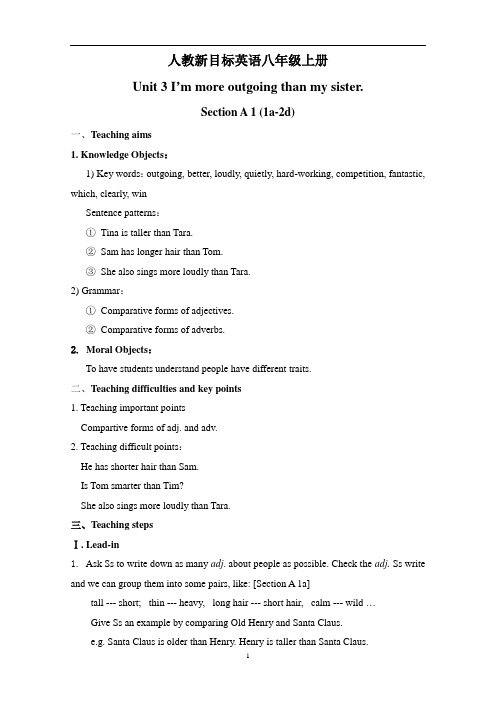
人教新目标英语八年级上册Unit 3 I’m more outgoing than my sister.Section A 1 (1a-2d)一、Teaching aims1. Knowledge Objects:1) Key words:outgoing, better, loudly, quietly, hard-working, competition, fantastic, which, clearly, winSentence patterns:①Tina is taller than Tara.②Sam has longer hair than Tom.③She also sings more loudly than Tara.2) Grammar:①Comparative forms of adjectives.②Comparative forms of adverbs.2. Moral Objects:To have students understand people have different traits.二、Teaching difficulties and key points1. Teaching important pointsCompartive forms of adj. and adv.2. Teaching difficult points:He has shorter hair than Sam.Is Tom smarter than Tim?She also sings more loudly than Tara.三、Teaching stepsⅠ. Lead-in1. Ask Ss to write down as many adj. about people as possible. Check the adj. Ss write and we can group them into some pairs, like: [Section A 1a]tall --- short; thin --- heavy, long hair --- short hair, calm --- wild …Give Ss an example by comparing Old Henry and Santa Claus.e.g. Santa Claus is older than Henry. Henry is taller than Santa Claus.Henry is younger than Santa Claus. Santa Claus is younger than Henry.Ⅱ. PresentationAsk Ss to see the pix about apples and pears to see the differences. Then compare some of their things with each other.e.g. The apples are bigger than the pears.The pears are more delicious than the apples.Summarize the Comparatives. Group competition.A + be(V) + 比较级+ than + B.Ⅲ. Game (I and my desk mate)Ask Ss to compare with their partners and find out the differences.e.g. She is heavier than me. I am more outgoing than her.She gets up earlier than me. I run faster than her.Ⅳ. ListeningThen listen to the recording. Ask Ss to number the twins.Check the answers.Ⅴ. Pair workPoint out the sample conversation in activity 1c.Say, now work with a partner. Make your own conversation about the twins.Ask several pairs to say one or more of their conversations.Ⅵ. Listening1. Work on 2a:Point out the two columns and read the headings: -er, -ier and more. Then point out the words in the box. Read them.Say, now listen and write the –er and –ier words in the first column and the words that use more in the second column.Play the recording and check the answers.2. Work on 2b.Point out the picture and the two boxes with the headings Tina is and Tara is.Say, listen to the recording. Write word in the boxes. The words are from the list in activity 2a.Play the recording and check the answers.Ⅶ. Pair work1. Point out the chart in activity 2c. Say, Make your own conversations according to the information. Ask pairs to continue on their own.2. Ss practice their conversations.3. Ask some pairs to act out their conversations.Ⅷ. Role-play1. Read the conversation first and try to match the people with the right things.a. sang betterb. with shorter hairc. practice more and really wanted to wind. sang more clearlye. danced better2. Let Ss read the conversations after the teacher.3. Let Ss practice the conversation.4. Then let some pairs act out their conversations in front of the class.Homework:Write six sentences:Write about the things that are the same and different between you and your best friend.Section A 2 (Grammar focus-3c)一、Teaching aims :1.Knowledge Objects :1) Review the comparative forms of adj and adv.2) Listening skill and speaking skill2. Moral Objects :Learn to how to be friendly to others.二. Teaching difficulties and key points1) not as …as …./ less …than2) more …than / as …as3 ) Know the difference between the adj and the adv.三、Teaching stepsⅠ. Warming- up and revision1. Ask some Ss compare he/she with his/her desk mates.I’m taller than my desk mate. But she runs faster than me.…2. Show some pictures on the big screen. Let some Ss compare the things.3. Show some adjectives or adverbs. Let Ss add -er, -r or -ier to them. Ⅱ. Grammar Focus(1) 汤姆比萨姆更聪明吗?Is Tom _______ _____ Sam?(2) 不是。
八年级英语上册 Unit3精品教学案(Word版共10课时) 牛津译林版
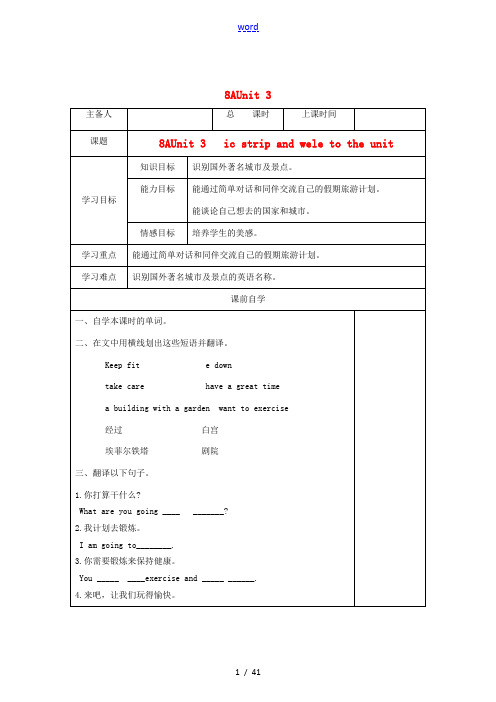
8AUnit 3导学案导学案导学案导学案导学案导学案导学案导学案导学案8A Unit 3参考答案导学案 1一、1.boat past 2.coffee 3.president 4.with 5.foreign二、1. How did you arrive at the World Park?2.I took a boat trip under the famous Harbour Bridge and went past the Opera House.3.Did you have a good time when you went out?4.What were they doing when you went past?三、C B C B导学案 2一、略。
三、1.Luckily 2.began 3.chose 4.to visit 5.to lend导学案 3一、略二、1.they their 2. us 3.ourselves 4.yourself 5.my 6.yours 7.themselves8.our 9.hers 10. you your mine导学案 4一、二、1.What do you think of the trip?2.How far is it from the school to the park?3.He often goes to New York by plane.4.I go home on my foot after school every day.5. She sometimes rides a bike to school.三、1.take underground to World Park 2.over hundred places interesthave no idea3.be careful too much traffic4.at the beginning of the meeting, sang5.on English, grades in导学案 5二、1. We can go to the Eiffel Tower or visit the pyramids first.2. The music was great but too loud.3. The Golden Gate Bridge was small and looked just like the one in America.4. Would you like some pears or grapes?5. spent on6.take an underground三、1.to go 2. to go 3.passing 4. not to cross5. play6. to buy7.don’t watch8. have四、1. you can go to Sanya or Guilin in the summer holiday.2. They are planning to go travelling tomorrow.3. Look! The children are playing hide-and-seek.4. Jack taught himself how to make a home page last year.导学案 6一、略二、1.help yourselves to 2.will hurt yourself 3.taught herself4.is pulling himself5.enjoyed ourselves6. by himself四、1.are preparing for 2.to stay at home, of going travelling, too much homework.3.to keep secret for each other4.Jiang Ming is ill now, and he can’t goto school.5.go swimming or fishing6.decided to7.planning for a really interesting trip.8.but he can’t so lve the problem.导学案 7一、1.cheerful 2.winners 3.final 4.supporters 5. receiving 6.cost二、1.more than two 2.cost him 3. which sportswoman to support 4.with many useful5.why not go/what about going三、go go go go going导学案 8三、1.to keep fit 2.taught himself 3. take photos 4.is knocking at5. hide-and-seek四、1.ourselves 2.beginning 3.watched 4.are going to fly 5. unpopular导学案 9一、略二、1.tries his best to 2.taught himself, home page 3.so many places of interest4. want to take, sunset5.climbs the rocks导学案 10一、1. It is sunny and our city looks more beautiful.2. He invited me to the morning assembly but I am too busy to go.3. On Sunday you can go horse riding or listen to pop music at home.4. The little boy is very young but knows more things than the other children.word5. My mother can do cooking for me at home or I can go to the restaurant for supper.二、1.stay 2.to do 3.to bee to treat 4.to go 5.to pull四、略8A Unit441 / 41。
外研版八年级英语上册教案 M3 Unit 3 教学设计
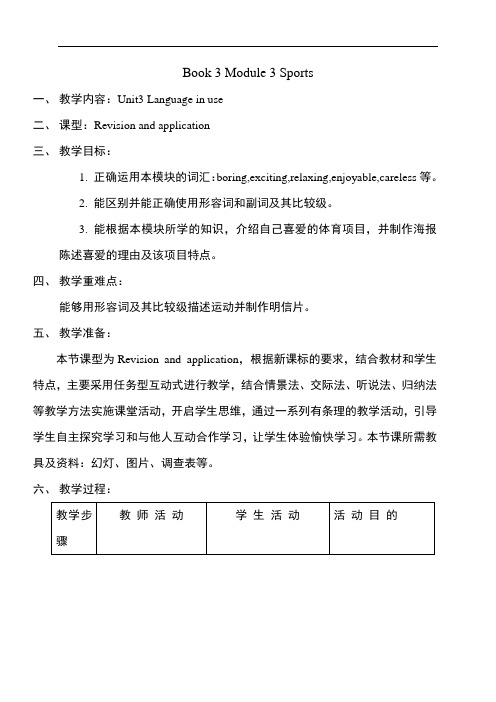
Book 3 Module 3 Sports一、教学内容:Unit3 Language in use二、课型:Revision and application三、教学目标:1. 正确运用本模块的词汇:boring,exciting,relaxing,enjoyable,careless等。
2. 能区别并能正确使用形容词和副词及其比较级。
3. 能根据本模块所学的知识,介绍自己喜爱的体育项目,并制作海报陈述喜爱的理由及该项目特点。
四、教学重难点:能够用形容词及其比较级描述运动并制作明信片。
五、教学准备:本节课型为Revision and application,根据新课标的要求,结合教材和学生特点,主要采用任务型互动式进行教学,结合情景法、交际法、听说法、归纳法等教学方法实施课堂活动,开启学生思维,通过一系列有条理的教学活动,引导学生自主探究学习和与他人互动合作学习,让学生体验愉快学习。
本节课所需教具及资料:幻灯、图片、调查表等。
六、教学过程:教师活动学生活动活动目的教学步骤1. Leadin g-in (7’)1.Show students ashort video aboutdifferent kinds ofball games.2.Have a free talkwith students.What’s yourfavourite sport?Why?1.The students watchthe video and learn thedifferent kinds of ballgames.2. Answer the questionslike this : My favouritesport is ...Because it’s...通过观看关于各种球类运动的视频,让学生从视觉上直观地了解各项球类运动的同时也活跃了课堂气氛,为进一步的学习做好铺垫。
通过与学生的自由交谈,复习了Unit1的知识点的同时也训练了学生的反应。
人教版英语八年级上册Unit 3 第5课时教案与反思

第五课时Section B(2a-2e) 投我以桃,报之以李。
《诗经·大雅·抑》翰辰学校李道友组长重点单词serious adj.严肃的;稳重的mirror n.镜子kid n.小孩;年轻人necessary adj.必需的;必要的grade n.成绩等级;评分等级重点单词should modal v.应该;应当;可以saying n.谚语;格言;警句reach v.伸手;到达;抵达hand n.手touch v.感动;触摸重点单词heart n.内心;心脏fact n.现实;事实break v.(使)破;裂;碎;损坏arm n.手臂;上肢share v.分享;共享;共用;分摊loud adj.响亮的;大声的similar adj.相像的;类似的重点短语enjoy doing sth.喜欢做某事make friends交朋友as long as只要;既然be different from与……不同;与……有差异bring out使显现;使表现出the same as和……相同;与……一致in fact确切地说;事实上;实际上be similar to与……相像的,类似的重点句子1.That's why I like reading books and I study harder in class.这便是我喜欢看书而且在班上学习更努力的原因。
2.But I think friends are like books—you don't need a lot of them as long as they're good.但我认为朋友就像书一样——朋友不在多而贵在好。
3.My best friend Larry is quite different from me.我最好的朋友拉里与我很不一样。
4.I don't really care if my friends are the same as me or different.我并不十分在乎我的朋友是否与我一样或不同。
牛津译林版八年级英语上册教案Unit3Reading
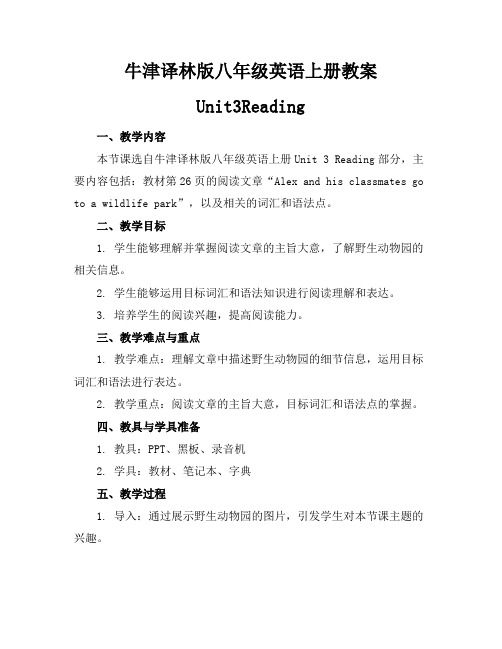
牛津译林版八年级英语上册教案Unit3Reading一、教学内容本节课选自牛津译林版八年级英语上册Unit 3 Reading部分,主要内容包括:教材第26页的阅读文章“Alex and his classmates go to a wildlife park”,以及相关的词汇和语法点。
二、教学目标1. 学生能够理解并掌握阅读文章的主旨大意,了解野生动物园的相关信息。
2. 学生能够运用目标词汇和语法知识进行阅读理解和表达。
3. 培养学生的阅读兴趣,提高阅读能力。
三、教学难点与重点1. 教学难点:理解文章中描述野生动物园的细节信息,运用目标词汇和语法进行表达。
2. 教学重点:阅读文章的主旨大意,目标词汇和语法点的掌握。
四、教具与学具准备1. 教具:PPT、黑板、录音机2. 学具:教材、笔记本、字典五、教学过程1. 导入:通过展示野生动物园的图片,引发学生对本节课主题的兴趣。
2. 预习:让学生自主阅读文章,了解文章大意,同时注意目标词汇和语法点。
3. 讲解:针对文章中的重点和难点进行详细讲解,包括词汇、语法和表达方式。
4. 实践:设置实践情景,让学生运用所学知识进行对话练习。
5. 例题讲解:分析教材第27页的练习题,引导学生正确解答。
6. 随堂练习:让学生完成教材第27页的练习题,巩固所学知识。
六、板书设计1. Unit 3 Reading2. 重点词汇:wildlife park, guide, feed, observe, endangered, express3. 重点语法:一般过去时4. 文章结构:引子结尾七、作业设计1. 作业题目:a. What did Alex and his classmates do in the wildlife park?b. Which animals did they see in the park?c. Why did they go to the wildlife park?(2)运用目标词汇和语法,编写一段关于自己去野生动物园的经历。
【人教版新目标】英语八年级上册Unit3单元教案
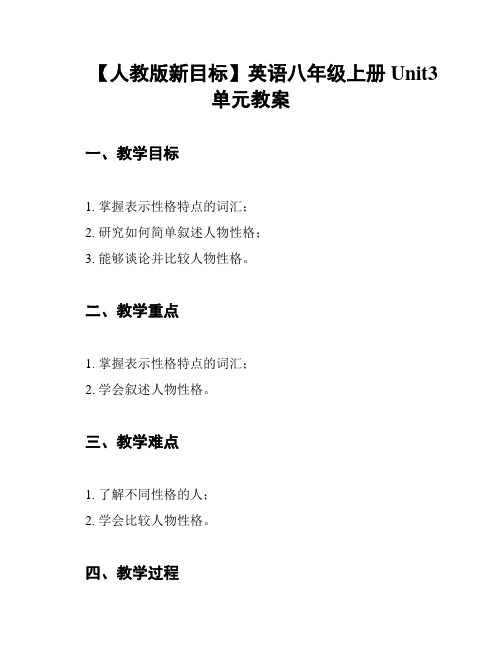
【人教版新目标】英语八年级上册Unit3单元教案一、教学目标1. 掌握表示性格特点的词汇;2. 研究如何简单叙述人物性格;3. 能够谈论并比较人物性格。
二、教学重点1. 掌握表示性格特点的词汇;2. 学会叙述人物性格。
三、教学难点1. 了解不同性格的人;2. 学会比较人物性格。
四、教学过程1. 导入新课:通过展示一组人物图片,鼓励学生来描述人物的性格特点。
2. 研究新知:让学生听录音,学生听完后,让他们试图按照录音说出其中的内容。
然后再让他们分组讨论和总结出几个常用的性格词汇。
3. 练:让学生两人合作,通过比较两个人的性格来进行对话。
老师可以设定一些场景,让学生进行角色扮演。
4. 家庭作业:让学生编写一篇短文,介绍自己的性格特点,并简单描述自己和至少一位朋友的共同之处和区别。
五、板书设计Lesson 1 PersonalitiesUseful words* outgoing* shy* confident* easygoing* honest* creativeTarget languageWhat's he/she like? He/She is...六、教学反思本课通过多种方式来帮助学生掌握表示性格特点的词汇,学会叙述和比较人物性格。
由于学生们年龄较小,因此在讨论性格的过程中,老师需要引导学生正确和客观的表述。
同时通过引导学生进行小组讨论,让学生们在不同的角度去理解人物性格,对于提高学生的思维能力也有一定的帮助。
总的来说,本课教学收到了很好的效果。
【人教版】八年级英语上册:Unit 3 优秀教学案(含答案解析)
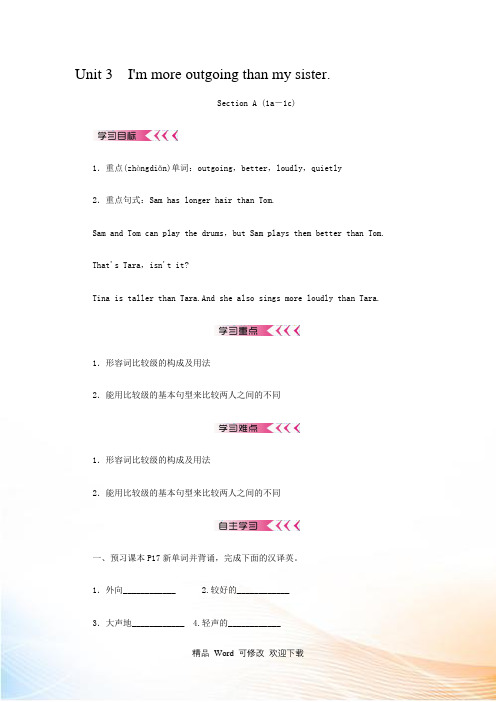
Unit 3I'm more outgoing than my sister.Section A (1a-1c)1.重点(zhòngdiǎn)单词:outgoing,better,loudly,quietly2.重点句式:Sam has longer hair than Tom.Sam and Tom can play the drums,but Sam plays them better than Tom.That's Tara,isn't it?Tina is taller than Tara.And she also sings more loudly than Tara.1.形容词比较级的构成及用法2.能用比较级的基本句型来比较两人之间的不同1.形容词比较级的构成及用法2.能用比较级的基本句型来比较两人之间的不同一、预习课本P17新单词并背诵,完成下面的汉译英。
1.外向____________ 2.较好的____________3.大声地____________ 4.轻声的____________二、认真(rèn zhēn)预习1a-1c,找出下列句型。
1.萨姆的头发比汤姆的头发长。
________________________________________________________________________ 2.萨姆和汤姆会敲鼓,但是萨姆敲得比汤姆好。
________________________________________________________________________ 3.那是塔拉,是吗?________________________________________________________________________ 4.蒂娜比塔拉高,而且她唱歌的声音也比塔拉大。
________________________________________________________________________Step 1情景导入Teacher shows some pictures of famous people,then compare the persons with Comparative Forms of Adjectives and Adverbs.环节说明:通过比较直接引入本节课的学习重点——形容词和副词的比较级。
英语八上-Unit3教案(完整版)

4. 我们可以用电脑来计算。(calculate) __W__e_c_a_n__u_s_e__c_o_m_p_u_t_e_r_s_t_o_c_a_l_c_u_l_a_te_.____________ 5. 此外,电脑还可以担任重要的工作,如操控铁路系统, 开飞机、宇宙飞船等。(in addition) __In__a_d_d_i_ti_o_n_,_c_o_m__p_u_te_r_s__c_a_n_d_o__im__p_o_r_ta_n__t _jo_b_s__li_k_e_ __o_p_e_r_a_ti_n_g__ra_i_lw__a_y_s_a_n_d__fl_y_in_g__p_l_a_n_e_s_a_n_d__s_p_a_c_e_s_h_ips. 6. 你的大脑能够产生出新的理念而电脑不能。(produce) __Y_o_u_r__b_ra_i_n_c_a_n__p_ro_d_u__ce__n_e_w__id_e_a_s__b_u_t _c_o_m_p_u_t_e_r_s__ __c_a_n_n_o_t_. ___________________________________
八年级 上册
Unit 3 Computers
知识导航
关键词汇: 1. 订货;订购 (n.)_____o_r_d_e_r_____ 2. 比较;对比 (v.)____c_o_m__p_a_r_e___ 3. (计算机)显示器 (n.)___m__o_n_it_o_r_____ 4. 扬声器 (n.)____s_p_e_a_k_e_r____ 5. (计算机)鼠标(n.)_____m__o_u_s_e____ 6. 打字( v.)___ty_p__e________ 7. 操作;控制(机器或系统等) (v.)___c_o_n_tr_o_l____
2020外研版英语(新标准)八年级上册Module5LaoSheTeahouseUnit3教案

Unit 3 Language in useⅠTeaching modelRevision and applicationⅡTeaching methodFormal and interactive practiceⅢTeaching aims1. Function: Talking about intentions and plans.2. Structure: Infinitive structures (1): infinitives as objects; verbs followed by infinitives.3. Around the world: Theatres4. Task: Acting out a scene from a play.ⅣTeaching aidsTape recorder, OHP, handoutsⅤTeaching StepsStep 1 RevisionTeahouse.1. Talk about Lao She’s2. Work in pairs to review the text of Unit 1 and Unit 2Step 2 Language practice1. Read through the example sentences in the box with the whole class.1) I wanted to see the Beijing Opera.2) Lingling offered to take me there.3) We only planned to watch for an hour.4) We decided to stay for three hours.5) I hope to understand more next time.2. Work in pairs.3. 动词不定式词组want to do sth.offer to do sth.decide to do sth.remember to do sth.forget to do sth.stop to do sth.agree to do sth.hope to do sth.like to do sth.Step 3 Grammar动词不定式的用法(1)动词不定式是由“to+动词原形”构成(有时可以不带to)。
Unit3-教案-2021-2022学年八年级英语人教版上册
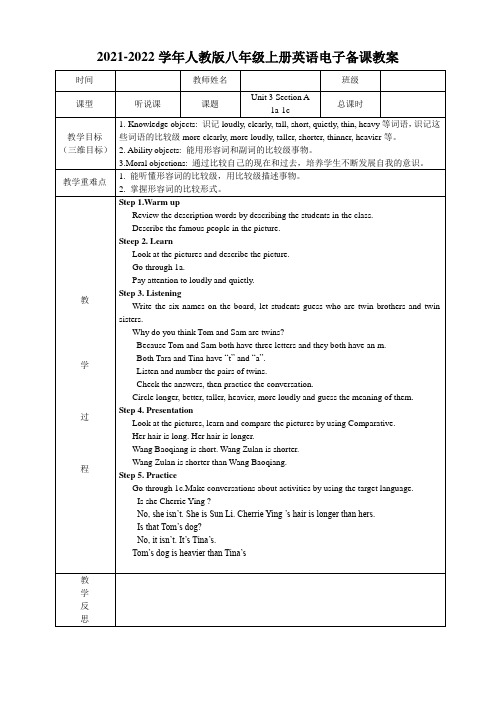
Write the six names on the board, let students guess who are twin brothers and twin sisters.
Why do you think Tom and Sam are twins?
Because Tom and Sam both have three letters and they both have an m.
Both Tara and Tina have“t”and“a”.
Listen and number the pairs of twins.
Check the answers, thenpracticethe conversation.
Circle longer, better, taller, heavier, more loudly and guess the meaning of them.
- No, she isn’t. She is Sun Li. Cherrie Ying ’s hair is longer than hers.
- Is that Tom’s dog?
- No, it isn’t. It’s Tina’s.
Tom’s dog is heavier than Tina’s
Go through the words in 2a. Read the words and guess the comparative forms of the words.
Step 3. Listening
Listen. Are the words in the box used with -(i)er or more?
人教版英语八年级上册Unit3口语教案

人教版英语八年级上册Unit3口语教案
目标
本课旨在帮助学生掌握以下口语交际能力:
- 询问和描述他人的兴趣爱好
- 询问和回答关于喜欢和不喜欢的问题
- 进行简单的购物对话
教学步骤
步骤一:导入
- 利用一些图片或简短的视频片段向学生引入课题,激发学生对兴趣爱好的讨论。
步骤二:词汇研究
- 引导学生研究相关的词汇,如hobby, like, dislike等。
通过图片、音频或其他互动方式帮助学生理解词汇的意义和用法。
步骤三:对话模仿
- 分组活动:将学生分成小组,让他们根据提供的对话模板进行练和模仿。
教师可以提供一些示范对话,并鼓励学生在实践中进行创造和变化。
步骤四:角色扮演
- 让学生进行角色扮演,演练各种口语对话情景。
鼓励他们使用所学的词汇和句型,并提供必要的反馈和指导。
步骤五:购物对话
- 引入购物对话的话题,向学生展示一些购物场景,并让他们使用口语交际技能进行模拟对话。
步骤六:总结
- 总结本课所学的内容,并鼓励学生在日常生活中积极运用这些口语交际能力。
教学资源
- 课件、图片、音频等素材
- 对话模板和练题
- 角色扮演情景卡片
- 购物对话展示素材。
人教版八年级英语上册第三单元教案
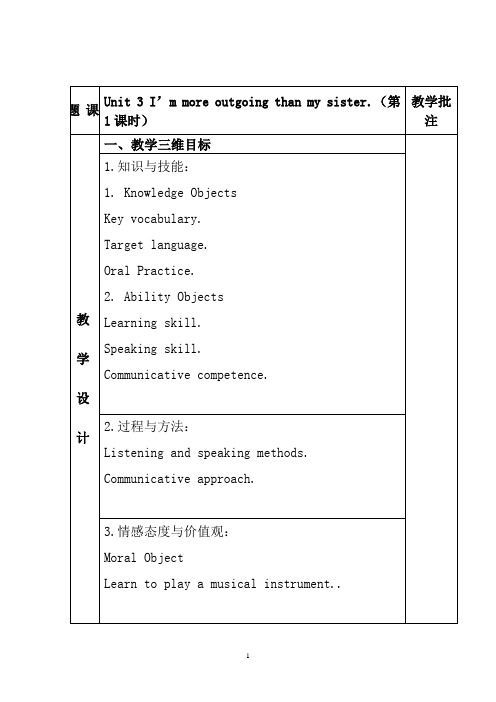
附赠材料优秀的教学是练出来的在上一堂课里,你已经学会了区分高效教学法和低效教学法之间的区别。
现在,我们还要继续巩固这一概念。
在高效教学法和低效教学法之间,是否存在一个灰色的中间地带呢?是的,这个灰色地带确实存在。
如果能带领那些还不够高效的教师们进人这一中间地带,那也是很大的进步。
当然,本课的主要目的是发掘出教师的最大潜力,以最终实现高效教学。
如果能成功做到这一点,那么你最终会发现学生的表现有了显著的提高。
显而易见,教师能力的优劣会直接影响到学生的表现。
教师越优秀,学生的表现就越好。
课程:首先,我们回顾一下上一节课所学的如何区分高效和低效教学上一节课,我已经要求你总结出自身存在的弱项,并且在课后进行针对性的练习。
今天,请你仔细思考,在下面列举的教学情景中高效和低效的教师将如何做出不同的应对措施。
高效教学与低效教学实践一个学生在课堂上一直和其他学生聊天。
他这个举动非常明显,必须及时制止。
面对这个情形时,低效的教师会如何应对?高效的教师又会如何应对?一个学生在课堂上不断发出声响,这个声音越来越吵,并且影响到了班级里的其他学生。
低效的教师会如何应对?高效的教师又会如何应对一个学生总是没有完成课后布置的家庭作业。
对这个学生低效的教师会如何应对?高效的教师又会如何应对?一个学生总是随便讲话。
教师在讲课的时候她讲话,同学们在做课堂练习的时候她讲话,午餐之前大家都应该安静等待的时候她也在讲话,在类似的其他场合她也经常随便讲话。
面对这个情形低效的教师会如何应对?高效的教师又会如何应对?学校准备开展一个新的教学项目,大家都不清楚这个项目效果如何。
为了顺利实施该项目,部分教师将被挑选出来进行培训培训过程很可能十分艰苦。
面对新项目的挑战,低效的教师会如何应对?高效的教师又会如何应对?当你回答完这些问题时,你一定会明白:高效的教师一定是个冷静、专业、细心的教师。
你愿意做这样的教师吗?如果愿意,那么就拿出你的实际行动来吧!实践:将你今天的感悟记录下来,这样可以让你意识到,自己之前的处理方式哪些是低效的手段,哪些是高效的手段。
- 1、下载文档前请自行甄别文档内容的完整性,平台不提供额外的编辑、内容补充、找答案等附加服务。
- 2、"仅部分预览"的文档,不可在线预览部分如存在完整性等问题,可反馈申请退款(可完整预览的文档不适用该条件!)。
- 3、如文档侵犯您的权益,请联系客服反馈,我们会尽快为您处理(人工客服工作时间:9:00-18:30)。
Go for it 8A Unit 3What are you doing for vacation?教案一、教学内容分析本单元是Go for it八年级上册中第三单元“What are you doing for vacation?”。
本单元的核心话题是谈论未来计划,课文始终围绕这一主题展开,我们要学习如何谈论假期的计划(Vacation plans),及对将来的安排(Future plans)。
让学生学会用what询问将要干什么并回答;用when, who, where, how long, how等词围绕未来计划进行提问和回答。
语言知识和语言技能部分主要是围绕核心话题时设计安排了许多听,说,读,写的任务活动,来不断丰富巩固这一话题的词汇及习惯短语。
我将灵活运用这些活动,并将其中的一些活动进行变化或整合。
二、教学目标分析根据《英语课程标准》关于总目标的具体描述,结合第三单元的教材内容,我按语言知识、语言技能、学习策略、情感态度、文化意识五个方面将本单元的教学目标细化:1、语言知识1.语音:在日常生活中做到语音、语调基本正确、自然、流畅。
2.词汇:(见教参)3.语法:①现在进行时表示将来用法及去做某事的go doing②用what, when, where, who 等对句中的事件、时间、地点、人物等提问。
4.功能: 谈论未来的计划安排5.话题: 熟悉有关度假的内容。
2、语言技能1.能听懂本单元学习活动中的问题,做出较得体的回答。
2.掌握有关假期生活的动词且能熟练运用;掌握wh-特殊疑问句的运用。
3.能运用所学词汇询问和表达未来打算,学会使用现在进行时态表示未来计划;4.能围绕未来计划这一话题作较具体的描述。
5.能读懂介绍未来打算的文章和日程安排。
6.学会书写即将发生的假期安排或计划和科学安排自己的假期活动.3、情感态度1.运用所学语言,积极投身到实践活动中去,实践自己的价值。
2.能在描述自己的计划和打算时,激起学生更加热爱祖国的美好河山和地球,从而为人类的美好明天贡献自己的一份力量。
4、学习策略1.能根据需要进行有目的预习,使其对教师的教学内容起补充作用。
2.抓住用英语交际的机会,在交际中把注意力集中在意思的表达上,必要时借助手势和表情。
3.主动参与学习活动,善于和他人合作。
4.能利用网络上的学习资源查找信息,用所学内容进行真实的交际,积极参与课外英语学习。
5、文化意识1.初步了解英语国家的地理位置、历史及假日的主要庆祝方式。
2.了解和熟悉当地地理,培养学生对本土文化的热爱,实现跨学科交流的目的。
三、教学重难点重点是‘talk about future plans’及本单元出现的词汇、句型和语法。
主要句型如下:What are you doing for vacation? I am spending time with my friendsWhen are you going?I’m going next week.How long are you staying?We are staying for two weeks.难点①如何培养学生根据阅读材料提高写作能力。
②本单元出现的be+doing均表示“打算做某事”,这与以前所学的现在进行时表“正在做某事”要学生注意通过上下文从意思上区分。
四、学情分析及教学策略在上册书中已学过用一般过去时谈论过去度假的表达,具有了学习本单元知识的认知前提,能自然地与本单元话题进行衔接。
因此,在本单元的对话中,教师可鼓励学生将过去度假的经历结合到本单元的对话中,充实对话内容,同时复习一般过去时。
谈论未来计划是人们日常生活中遇到的话题,故学生喜于用英语表达此类知识。
教师可在课前请学生在各种资料上查阅一些国内外风景名胜的情况介绍,包括其名称、所在国、气候、风景特点等,以便在对话时有更大的自由表达空间,同时与其他同学互相学习、互通信息。
同时教师也查阅一些资料提供给学生。
教师应从学生的生活经验和兴趣出发,在课堂教学中应设计任务型教学活动,体现以学生为主体的教学活动,让学生在完成各项任务的过程中自主学习语言,提高综合运用语言能力。
五、主题语表↖↙Vacation plans↗↘六、课时结构根据本单元教材的内容、学生学习英语的特点和规律,我把本单元内容整合为4课时:Period1 (Section A 1a/1b/1c /2c SectionB1a/1b/4)Period2 (Section A 2a/2b/SectionB2a/2b/ 2c /Selfcheck2)Period3 (Section B2c / Section A 3a/3b/ 课外阅读(go camping)/4)Period4 (Just for fun/SectionB3a/3b/3c/ Selfcheck1/自编的Selfcheck)每课时都有一个主题:Period1---Speaking,Period2---Listening, Period3---Reading, Period4--- Writing。
但每课时都始终坚持任务目标→导说领先→活动或讨论→反馈或笔头落实→环环相扣,逐步铺垫。
其根本目的在于突出重点,使课堂节奏紧凑,连贯,达到知识到能力的正向迁移。
七、教学过程设计Period1I.教学目标:1.知识目标:1).单词:babysit, camp, bike, ride, sightseeing, fish, rent.2).句型:What are you doing for vacation? I’m visiting my grandmother.What’s she doing for vacation? She’s going camping.What are they doing for vacation? They’re relaxing at home.2.能力目标:1)学完本课,学会学习谈论将来的计划。
2)学习用现在进行时表示将来时。
3)能积极思维,运用所学单词,短语及句型,结合实际生活进行灵活运用。
3.情感态度目标:让学生熟悉和理解不同的生活和度假方式。
II.教学重点: 掌握本课新单词和句型和怎样谈论将来的计划,及提高学生说的能力。
III.教学难点:掌握怎样谈论将来的计划的方法和提高学生说的能力。
IV. 教学设计:Step1Brain stormCollect the names of activities which said by students.Step2 Revision(pair work)Revise something about vacation by asking:Where did you go on vacation?How was your vacation?Step3 Lead-in①通过看a video 进行match 来复习现在进行时。
②Show students a big calendar which prepared before class, and say:Today is Thursday. Two days later is Saturday. I am staying at home on Saturday. And I am not going out.And ask students:What about you? What are you doing on Saturday?学生做出各种不同的回答,教师将句子I am staying at home on Saturday。
及学生回答中的动词短语写在黑板上,通过朗读回顾知识。
这里应提醒学生注意be doing sth.用现在进行时代表将要发生的动作,表示对未来的计划和安排,译为“我将要…”,“我打算…”,而不是正在做某事。
eg . What’s she doing for vacation? 她假期要做什么?She’s babysitting her sister. 她要看她妹妹。
这是我们进入初中以来第一次接触到将来时。
这种用现在进行时表示将来动作的用法,实际上在英语中是很常见的。
Step4 Presentation (SectionB1a /SectionA1a)①National Day is coming. What are you doing for vacation?(通过各种图片来教学词汇与短语--- going bike riding, going sightseeing, taking walks, going fishing, renting videos, camping, babysitting, exercising etc )②Finish Section B 1a. Match the words with the pictures. Keys: d b c a e.教师提醒学生,这些都是表动作的短语,要求学生朗读,然后造句。
③Finish Section A 1a. Look at the vacation activities in the picture. Make a list and add some more. Step5: Listening (Section A 1b)Listen to the conversations and number the picture[1-3]We will listen twice.The first time, just listen.The second time,listen and fill in the blanks.Step6:Practice (Section A 1c)利用先前出示的图片来操练What’s she/he/ doing for vacation?What are they doing for vacation?Step7: Survey (Section A 2c)Ask classmates what they are doing for next vacation.What are you doing for vacation?Step8:Good morning! In my group, Li Chen is …Step9: Homework①(P17 Survey) Make a survey about what your classmate s’ weekend plans and write a report.②预习Section A 2a/2b2c, Section B 2a/2b/2c③查询有关楠溪江之游的资料。
